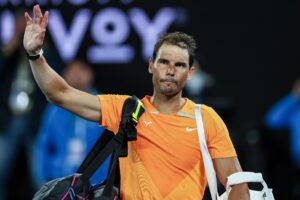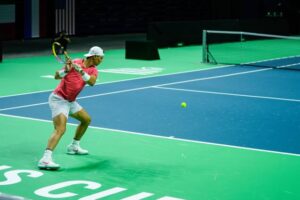In this golden era for men’s tennis, dominated by three of the greatest to ever play the sport, it would be all too easy to overlook the contributions of Spain’s David Ferrer. The Valencian naturally falls under the long shadow cast by his illustrious compatriot Rafael Nadal, to whom he so long played second fiddle and got the better of so rarely. He also owned poor records against the other two members of that golden trio, losing all 17 of his contests with Roger Federer and beating Novak Djokovic only five times in 21 meetings.
But he is hardly alone in having struggled against those colossal figures. Indeed, to judge him on his record against them would be to miss the appeal of Ferrer. And there certainly is such an appeal. One need look no further than the outpouring of affection – from fans, pundits and players alike – that has greeted him on every stop of his farewell tour, which is set to end in his retirement at the Madrid Open in May.
But though the end is now near for Ferrer, he has shown in Miami, where he held championship points in 2013 only to come up agonisingly short against Andy Murray, that he has no intention of going quietly into the night, as though he could ever have countenanced such a thing. In the first round, he produced a performance reminiscent of the Ferrer of old to cut Sam Querrey down to size, dismissing the American in straight sets, 6-3 6-2.
That earned him a shot against second seed Alexander Zverev of Germany, the leading light of the Next Gen, expected to take over the mantle of challenging the Great Three from the likes of Ferrer. But the Spaniard, using every ounce of his guile and craft, instead reminded Zverev of just how good this fading generation once were. Despite losing a one-sided first set, in which he struggled to master Zverev’s formidable power, he dug in to win a hard-fought second set.
Then, in the third set, his gladiatorial instincts came to the fore. Turning the match into a gritty dogfight, he wore down Zverev, preying on the German’s mental frailties and punishing his second serve ruthlessly. Zverev did not help his cause, serving 12 double faults across the three sets, but the match, in truth, was not about him. Rather it was about Ferrer doing what he has always done best, what he has built his entire career on: grinding out a win against a more favoured opponent.
And there lies the appeal of the tenacious Spaniard. He has long, fairly or not, been perceived as the great underdog. Lacking the ferocious power of the game’s other challengers, he made up for his inability to rely on regularly hitting outright winners with a commendable work ethic. It was drilled into him from an early age by his long-time coach Javier Piles and a now famous stint as a bricklayer. And it allowed him, more often than not, to beat the best of the rest.
Jo-Wilfried Tsonga, the flamboyant and thrilling Frenchman, lost three of his four clashes with Ferrer. The big-serving John Isner won twice against Ferrer, but tasted defeat seven times, whilst the 2014 US Open champion Marin Cilic trails 2-4 in their head-to-head. Even the mighty Juan Martin del Potro could only carve out a narrow advantage, beating Ferrer seven times but losing to him in six matches. And the Argentine’s last three wins only came in 2018, by which time Ferrer was already struggling badly with the injuries that, come May, will end his career.
Ferrer won a fairly astonishing 27 titles, including the Paris Masters in 2012. He also battled into the French Open final in 2013, and reached two semifinals at both the Australian and US Opens. He even, despite being no grass-court specialist, reached two Wimbledon quarterfinals. Ferrer also broke into the world’s top three, a feat equalled by almost none of his peers. Such a complete resume does rather undermine his consistent underdog status.
He was certainly far from talentless. In his prime, Ferrer was the third best returner on the tour, no mean feat in the era of Djokovic and Murray. His ability to take the ball on the rise, accurately, allowed him to maintain an aggressive court position and he could inject real power into his forehand when given time on the ball. His backhand was also rock solid and his volleys underrated, particularly on clay, a surface he always had a very natural understanding of how to play on.
But, ultimately, Ferrer will be remembered for none of those qualities. For they are not what made him successful. It was always his attitude that set him apart, a competitive fire that age has not dimmed, even if it has robbed him of the fitness-levels required to play his dogged brand of defensive tennis. It was on full display against Zverev and the German will not forget the chastening lesson it gave him. Nor will the countless other players ground down into the dust by Ferrer.
And that is surely a legacy worth having.
Main photo:
Embed from Getty Images





